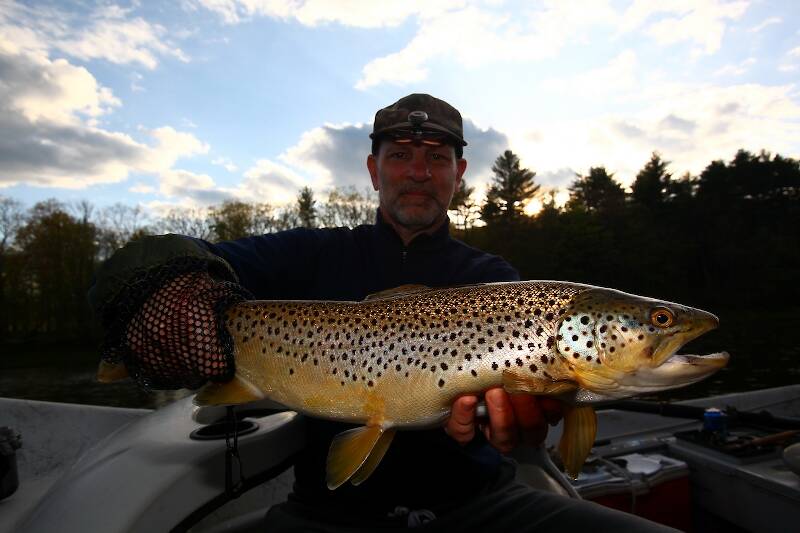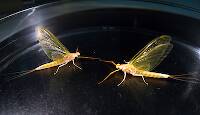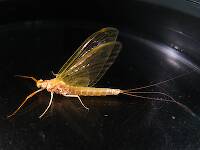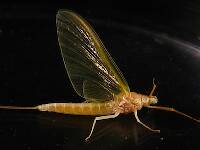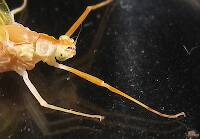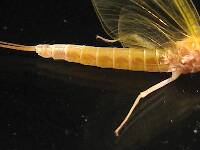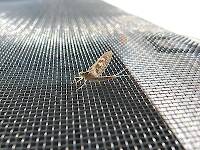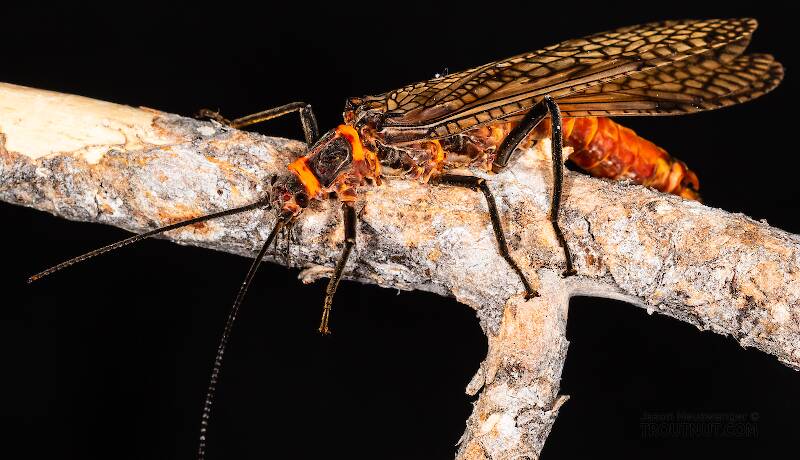
Salmonflies
Pteronarcys californica
The giant Salmonflies of the Western mountains are legendary for their proclivity to elicit consistent dry-fly action and ferocious strikes.
Featured on the forum
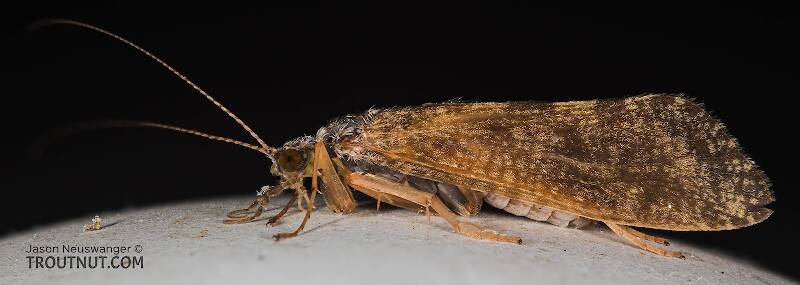

Troutnut is a project started in 2003 by salmonid ecologist Jason "Troutnut" Neuswanger to help anglers and
fly tyers unabashedly embrace the entomological side of the sport. Learn more about Troutnut or
support the project for an enhanced experience here.
Goose
Posts: 77
Posts: 77
Goose on Sep 20, 2006September 20th, 2006, 3:56 am EDT
Jason, I just read your commentary on Latin names vs. common names and I do get the point and you're right. It certainly is needed to distinguish, for example, sulfurs from sulfurs, etc.
Troutnut on Sep 20, 2006September 20th, 2006, 5:10 am EDT
Thanks. :) Here's a link to that commentary for anyone who's wondering.
Jason Neuswanger, Ph.D.
Troutnut and salmonid ecologist
Troutnut and salmonid ecologist
Cirrus
Posts: 4
Posts: 4
Cirrus on Oct 9, 2006October 9th, 2006, 4:30 am EDT
Hi everyone,
Great site Jason!!
I just read the commentary on Latin names and I was wondering...is there any good books or web sources on how to pronounce some of the names. I've heard the Iso's called three different names by three different people this year and I dont know which one is correct!
Thanks!
Great site Jason!!
I just read the commentary on Latin names and I was wondering...is there any good books or web sources on how to pronounce some of the names. I've heard the Iso's called three different names by three different people this year and I dont know which one is correct!
Thanks!
Troutnut on Oct 9, 2006October 9th, 2006, 4:46 am EDT
There's a guide to the pronunciation of Latin names on pages 35-36 of Caucci and Nastasi's Hatches II.
Jason Neuswanger, Ph.D.
Troutnut and salmonid ecologist
Troutnut and salmonid ecologist
GONZO on Oct 9, 2006October 9th, 2006, 8:46 am EDT
Hey Cirrus--
Good luck with the pronunciations! There's also a guide on pp. 344-346 of Mayflies by Knopp, but they don't all agree with Hatches (and both deal only with mayflies).
I can remember saying Hexagenia rigida the way they show it in Mayflies ("ridge-eye-dah") and being corrected by an entomologist--he said "rigid-uh," the way they show it in Hatches. And I always want to say the "-ae" ending like long "a" instead of long "e."
Unless you're a pre-English-Mass Catholic or a Classics scholar, you'll probably have trouble with many of them. Don't worry. It's not even "real" Latin. Some names are Greek, or just "latinized" versions of English or people's names.
My solution is to use them in writing (to be accurate), but to avoid them as much as possible in conversation. This is not because I buy into the reverse-snobbery about avoiding scientific names, it's just that I pronounce them so badly! :)
Good luck with the pronunciations! There's also a guide on pp. 344-346 of Mayflies by Knopp, but they don't all agree with Hatches (and both deal only with mayflies).
I can remember saying Hexagenia rigida the way they show it in Mayflies ("ridge-eye-dah") and being corrected by an entomologist--he said "rigid-uh," the way they show it in Hatches. And I always want to say the "-ae" ending like long "a" instead of long "e."
Unless you're a pre-English-Mass Catholic or a Classics scholar, you'll probably have trouble with many of them. Don't worry. It's not even "real" Latin. Some names are Greek, or just "latinized" versions of English or people's names.
My solution is to use them in writing (to be accurate), but to avoid them as much as possible in conversation. This is not because I buy into the reverse-snobbery about avoiding scientific names, it's just that I pronounce them so badly! :)
Taxon on Oct 9, 2006October 9th, 2006, 11:47 am EDT
My solution is to use them in writing (to be accurate), but to avoid them as much as possible in conversation. This is not because I buy into the reverse-snobbery about avoiding scientific names, it's just that I pronounce them so badly! :)
Well, that one actually brought tears to my eyes! The only saving grace is that, one so rarely runs into someone who not only knows the correct pronunciation, but is also either confident enough, or enough of a a/h to correct you.
Cirrus
Posts: 4
Posts: 4
Cirrus on Oct 9, 2006October 9th, 2006, 12:51 pm EDT
Gonzo
LOL...thats what I mean! One guy says to me "bee_A_tus" for a BWO...when i see on the net its "beet_us". I just dont want to sound like an idiot(which is easy for me)when I ask a Q about some fly I want to tie or buy.
LOL...thats what I mean! One guy says to me "bee_A_tus" for a BWO...when i see on the net its "beet_us". I just dont want to sound like an idiot(which is easy for me)when I ask a Q about some fly I want to tie or buy.
Troutnut on Oct 9, 2006October 9th, 2006, 2:47 pm EDT
I've seen it as "bay-tis."
Jason Neuswanger, Ph.D.
Troutnut and salmonid ecologist
Troutnut and salmonid ecologist
GONZO on Oct 9, 2006October 9th, 2006, 4:06 pm EDT
Roger, thanks for the support! When the guy correcting me is an honest-to-goodness entomologist, I take my comeupance like the properly chastised layman that I am; but when it's someone else, you may be right about the a/h thing.
Cirrus, don't sweat it! I think anyone who tries to say the names publicly has more guts than I usually do. I'll pretend not to know what the names are until someone volunteers a pronunciation, then I'll follow his lead.
And Jason, that's the way I say it--"bay-tis" (only quietly and covered by a cough). But, I have that problem with "ae" so I'm probably wrong. Caucci (how many ways have you heard his name pronounced?) shows it as "bait-iss" or "beat-iss."
Then again, Tim Fox named one of his BWO patterns "Fox's Beottis"--I wonder if he knows something I don't? Of course, he also calls his caddis pupa pattern "Fox's Poopah," and we all know that if he were really trying to be correct he'd call it "Fox's Pharate Adult!"
Cirrus, don't sweat it! I think anyone who tries to say the names publicly has more guts than I usually do. I'll pretend not to know what the names are until someone volunteers a pronunciation, then I'll follow his lead.
And Jason, that's the way I say it--"bay-tis" (only quietly and covered by a cough). But, I have that problem with "ae" so I'm probably wrong. Caucci (how many ways have you heard his name pronounced?) shows it as "bait-iss" or "beat-iss."
Then again, Tim Fox named one of his BWO patterns "Fox's Beottis"--I wonder if he knows something I don't? Of course, he also calls his caddis pupa pattern "Fox's Poopah," and we all know that if he were really trying to be correct he'd call it "Fox's Pharate Adult!"
GONZO on Oct 9, 2006October 9th, 2006, 4:44 pm EDT
Way to go, Roger! Your link to the "Pronunciation of Biological Latin..." got plugged right in to my "Favorites" list. I promise to work on it, but I know I'll never get used to saying "BEET-ah-dee." That double whammy "ae" is more than I can handle! :)
Taxon on Oct 9, 2006October 9th, 2006, 5:24 pm EDT
Gonzo-
Yeah, I know what you mean. I have to stifle the urge to place my hand in front of my mouth and murmur whenever forced to pronounce taxonomic names out loud.
Yeah, I know what you mean. I have to stifle the urge to place my hand in front of my mouth and murmur whenever forced to pronounce taxonomic names out loud.
Cirrus
Posts: 4
Posts: 4
Cirrus on Oct 10, 2006October 10th, 2006, 1:41 am EDT
Gonzo that cracked me up...as I usually dont say anything either till I hear someone else say it...lol. Or I start trying to pronounce it and add in a quick cough. Think I'll just go back to saying.."I'm trying to imitate a dark olive body mayfly" and leave it at that. :)
As far as BWO's I say it like Jason does..."bay_tis". Thanks for the link Roger.
As far as BWO's I say it like Jason does..."bay_tis". Thanks for the link Roger.
Taxon on Nov 27, 2006November 27th, 2006, 5:05 pm EST
Most of my peers in science pronounce the names wrong--the entomologist included in this thread, for instance.
Should that be "wrongly?" In any event, who would be "the entomologist involved in this thread?" Are you referring to the one who discussed the pronunciation of Callibaetis at a club meeting. If so, in what way was he wrong?
Troutnut on Nov 27, 2006November 27th, 2006, 5:57 pm EST
Thanks for the insight David. I'm glad somebody's willing to look at the actual Latin, because I'm definitely not! I started taking it for my language requirement at Cornell several years ago, and when we got up to the 60-some different words for this/that/these/those, I dropped it.
You bring up a good point that scientific names aren't really Latin. I like the term "Latinized" to describe them, though as you suggested they're a pretty varied mix.
You bring up a good point that scientific names aren't really Latin. I like the term "Latinized" to describe them, though as you suggested they're a pretty varied mix.
Jason Neuswanger, Ph.D.
Troutnut and salmonid ecologist
Troutnut and salmonid ecologist
Martinlf on Nov 27, 2006November 27th, 2006, 6:04 pm EST
As a student of Latin and Linguistics, in the spirit of fun I'd make the following observations. The pronunciation of Latin, like that of English, is subject to a number of variations. Listen to the BBC news for a week and these days you will hear a wide variety of dialectal pronunciations, none of which are wrong though they are probably not yours or mine. For modern pronuncers of Latinized names we have at our disposal semi-hypothetical classical pronunciations and at least two modern pronunciations used by scholars in different English speaking countries. The linguist in me says, for English or for Latinized names, to use (as best you can) the pronunciation commonly accepted by those in your dialect community, but avoid correcting anyone whose pronunciation may be considered correct in her or his language group. Furthermore, if inconsistency seems a problem, it may be useful to remember that English is rife with pronunciation inconsistencies as noted by Shaw's humorous spelling of fish as "ghoti." (with the [gh] from "laugh", the [o] from "women" and the [ti] from "nation"). I'm sure David's analysis of the long a sound's origin for -ae is correct, but I pronounce baetis "bay tis" as most of my Latinized piscator friends do (though, following Jason and Gonzo I am starting to prefer the term baetids for the little olive buggers). And although bee tis sounds funny to me, I'm not correcting anyone who says it: who knows from where they come? Even so, my classical background leads me to further inconsistency in pronouncing the ae plural at the end of Latin and Latinized words as a long i. Puellae just will never feel quite right to me with a long e sound at the end (or with a long a for that matter). That said, I pronounce (and spell) encyclopedia the way most of us do, and I spell Julius's title Caesar and pronounce its ae with a long e sound. If this solution is one up with which some will not put, I recommend to them the following light reading:
The History of Latin Pronunciation
Allen, W. Sidney. Vox Latina: A Guide to the Pronunciation of Classical Latin. 2nd ed. Cambridge University Press, 1978.
Brittain, Frederick. Latin in Church: Episodes in the History of its Pronunciation, Particularly in England. Cambridge University Press, 1934.
Brittain, Frederick. Latin in Church: The History of its Pronunciation. New ed., rev. and enlarged. Alcuin Club Tracts 28. London: A.R. Mowbray, 1955.
Collins, John F. A Primer of Ecclesiastical Latin. Washington, D.C.: Catholic University of America Press, 1985.
Copeman, Harold. Singing in Latin, or, Pronunciation explor'd. Oxford: by the author, 1990; available from the author at 22 Tawney Street, Oxford OX4 1NJ.
Reviews: Douglas Leedy in Performance Practice Review 5 (1992), 103-8. Lawrence Rosenwald Historical Performance: The Journal of Early Music America 5/1 (1992), 47-50. Gunilla Iversen in The Early Drama, Art, and Music Review 15 (1992-3), 19-22.
Daitz, Stephen G. The Pronunciation and Reading of Classical Latin: A Practical Guide. The Living Voice of Greek and Latin Literature. Guilford, CT: Jeffrey Norton, 1984. [a tape cassette with a booklet]
Duffin, Ross W. "National Pronunciations of Latin ca. 1490-1600." The Journal of Musicology 4 (1985-6) 217-26.
Kelly, H. A. "Pronouncing Latin Words in English." Classical World 80 (1986) 33-7.
Ranum, Patricia M. Me'thode de la prononciation latine dite 'Vulgaire' ou 'a la franc,aise': Petite me'thode a` l'usage des chanteurs et des re'citants d'apre`s le manuscrit de dom Jacques Le Clerc (vers 1665). Se'rie "Musique" ed. Alain Artaud. Arles: Actes Sud, Hubert Nyssen Editeur, 1991.
Scherr, Vera U. G. Auffu"hrungspraxis Vokalmusik: Handbuch der lateinischen Aussprache, Klassisch -- Italienisch -- Deutsch, mit ausfu"hrlicher Phonetik des Italienischen. Kassel: Ba"renreiter, 1991.
Sonkowsky, Robert P. Selections from Vergil, Read in Classical Latin. The Living Voice of Greek and Latin Literature. Guilford, CT: Jeffrey Norton, 1985. [cassette tapes with a booklet]
Trusler, Ivan. The Choral Director's Latin. Lanham, Maryland: University Press of America 1987.
Wray, Alison. "Authentic Pronunciation for Early Music." Companion to Contemporary Musical Thought. Ed. John Paynter, Tim Howell, Richard Orton, Peter Seymour. London & New York: Routledge, 1992: vol. 2: 1051-64
One can also learn much about the pronunciation of medieval Latin from studying the historical development of the Romance languages. Some examples:
Joseph Louis Barbarino, The Evolution of the Latin /b/-// Merger: A Quantitative and Comparative Analysis of the B-V Alternation in Latin Inscriptions. North Carolina Studies in the Romance Languages and Literatures 203. Chapel Hill: U.N.C. Department of Romance Languages, 1978.
Joseph Louis Barbarino. Latin and Romance Intervocalic Stops: A Quantitative and Comparative Study. Studia Humanitatis. Madrid: Jose' Porru'a Turanzas S.A.; Potomac, Maryland: Studia Humanitatis, 1981.
Klausenburger, Ju"rgen. Morphologization: Studies in Latin and Romance Morphophonology. Tu"bingen: Niemeyer, 1979.
Wright, Roger. Late Latin and Early Romance in Spain and Carolingian France. Liverpool: F. Cairns, 1982.
Wright, Roger, ed. Latin and the Romance Languages in the Early Middle Ages. London and New York: Routledge, 1991.
The History of Latin Pronunciation
Allen, W. Sidney. Vox Latina: A Guide to the Pronunciation of Classical Latin. 2nd ed. Cambridge University Press, 1978.
Brittain, Frederick. Latin in Church: Episodes in the History of its Pronunciation, Particularly in England. Cambridge University Press, 1934.
Brittain, Frederick. Latin in Church: The History of its Pronunciation. New ed., rev. and enlarged. Alcuin Club Tracts 28. London: A.R. Mowbray, 1955.
Collins, John F. A Primer of Ecclesiastical Latin. Washington, D.C.: Catholic University of America Press, 1985.
Copeman, Harold. Singing in Latin, or, Pronunciation explor'd. Oxford: by the author, 1990; available from the author at 22 Tawney Street, Oxford OX4 1NJ.
Reviews: Douglas Leedy in Performance Practice Review 5 (1992), 103-8. Lawrence Rosenwald Historical Performance: The Journal of Early Music America 5/1 (1992), 47-50. Gunilla Iversen in The Early Drama, Art, and Music Review 15 (1992-3), 19-22.
Daitz, Stephen G. The Pronunciation and Reading of Classical Latin: A Practical Guide. The Living Voice of Greek and Latin Literature. Guilford, CT: Jeffrey Norton, 1984. [a tape cassette with a booklet]
Duffin, Ross W. "National Pronunciations of Latin ca. 1490-1600." The Journal of Musicology 4 (1985-6) 217-26.
Kelly, H. A. "Pronouncing Latin Words in English." Classical World 80 (1986) 33-7.
Ranum, Patricia M. Me'thode de la prononciation latine dite 'Vulgaire' ou 'a la franc,aise': Petite me'thode a` l'usage des chanteurs et des re'citants d'apre`s le manuscrit de dom Jacques Le Clerc (vers 1665). Se'rie "Musique" ed. Alain Artaud. Arles: Actes Sud, Hubert Nyssen Editeur, 1991.
Scherr, Vera U. G. Auffu"hrungspraxis Vokalmusik: Handbuch der lateinischen Aussprache, Klassisch -- Italienisch -- Deutsch, mit ausfu"hrlicher Phonetik des Italienischen. Kassel: Ba"renreiter, 1991.
Sonkowsky, Robert P. Selections from Vergil, Read in Classical Latin. The Living Voice of Greek and Latin Literature. Guilford, CT: Jeffrey Norton, 1985. [cassette tapes with a booklet]
Trusler, Ivan. The Choral Director's Latin. Lanham, Maryland: University Press of America 1987.
Wray, Alison. "Authentic Pronunciation for Early Music." Companion to Contemporary Musical Thought. Ed. John Paynter, Tim Howell, Richard Orton, Peter Seymour. London & New York: Routledge, 1992: vol. 2: 1051-64
One can also learn much about the pronunciation of medieval Latin from studying the historical development of the Romance languages. Some examples:
Joseph Louis Barbarino, The Evolution of the Latin /b/-// Merger: A Quantitative and Comparative Analysis of the B-V Alternation in Latin Inscriptions. North Carolina Studies in the Romance Languages and Literatures 203. Chapel Hill: U.N.C. Department of Romance Languages, 1978.
Joseph Louis Barbarino. Latin and Romance Intervocalic Stops: A Quantitative and Comparative Study. Studia Humanitatis. Madrid: Jose' Porru'a Turanzas S.A.; Potomac, Maryland: Studia Humanitatis, 1981.
Klausenburger, Ju"rgen. Morphologization: Studies in Latin and Romance Morphophonology. Tu"bingen: Niemeyer, 1979.
Wright, Roger. Late Latin and Early Romance in Spain and Carolingian France. Liverpool: F. Cairns, 1982.
Wright, Roger, ed. Latin and the Romance Languages in the Early Middle Ages. London and New York: Routledge, 1991.
"He spread them a yard and a half. 'And every one that got away is this big.'"
--Fred Chappell
--Fred Chappell
Troutnut on Nov 27, 2006November 27th, 2006, 6:23 pm EST
English is rife with pronunciation inconsistencies as noted by Shaw's humorous spelling of fish as "ghoti." (with the [gh] from "laugh", the [o] from "women" and the [ti] from "nation").
That's hilarious! I hadn't seen that one before.
If this solution is one up with which some will not put
That reminds me of the Churchill quote about dangling prepositions, "This is the sort of English up with which I will not put."
Jason Neuswanger, Ph.D.
Troutnut and salmonid ecologist
Troutnut and salmonid ecologist
GONZO on Nov 27, 2006November 27th, 2006, 9:09 pm EST
Roger,
I believe Dave is referring to the entomologist who (mistakenly?)corrected my pronunciation of rigida. Recently, I was glancing through a friend's copy of Hatches II and noticed that the pronunciation key differed from the original Hatches. The "rigid uh" pronunciation was changed to "ridge eye duh" in H II. While I am deeply gratified that the consensus of opinion seems to have swung in my favor, this is not a particularly serious thread and I'd like to try to defend the unfortunate entomologist who corrected me. (He shall remain nameless. I have great respect for his knowledge, if not his pronunciation.)
As Dave, Jason, and I have previously mentioned, the "bug-Latin" we use is a composite of many words (and names) from many languages. Because of this, I'm not sure how far we should go when trying to establish the correct pronunciation of a bastardized artificial language, especially in this case. Unless I am mistaken in my layman's interpretation, the trivial epithet rigida is descriptive of the distinctive shape of this particular mayfly's penis. When McDunnough identified this characteristic in 1924, I'm pretty sure that the word that came to mind was the English word "rigid" and not one of its antecedent Latin roots. To superimpose a Latin pronunciation on this rather immodest observation seems a bit like trying to make a silk purse out of a sow's ear. The expression may be elevated, but the idea is still pretty crude. Similarly, the species name of the caddisfly Pycnopsyche scabripennis sounds pretty highfalutin' until you know what it means. If I were that caddisfly, I'd still be insulted no matter how well the epithet was pronounced. "Sir, the name is Great Red Sedge, if you please!" would be my indignant response.
I say all of this purely for the sake of good-natured amusement (my own, if no one else's). I only wish to point out that, beyond our friendly little circle of Latinophilic bug-geeks, it is quite possible to put too fine a point on things and thus be impaled by one's own sharpness. That is exactly what would happen if I were to walk into a local fly shop and ask if any Baetis (pronouncing it BEET-is) were hatching. Explaining that this is the proper pronunciation would be unlikely to significantly improve my standing. I believe that most Americans take a stubborn backwoods pride in their inability to properly pronounce Latinate "ae" words--that is precisely why American dictionaries spell the words hemoglobin, pediatrician, and encyclopedia the way they do. Yes, we accommodate Caesar; but the word that refers to the way the old Roman dictator was "untimely ripped" from his mother's womb is often spelled Cesarean or even Cesarian. :)
I believe Dave is referring to the entomologist who (mistakenly?)corrected my pronunciation of rigida. Recently, I was glancing through a friend's copy of Hatches II and noticed that the pronunciation key differed from the original Hatches. The "rigid uh" pronunciation was changed to "ridge eye duh" in H II. While I am deeply gratified that the consensus of opinion seems to have swung in my favor, this is not a particularly serious thread and I'd like to try to defend the unfortunate entomologist who corrected me. (He shall remain nameless. I have great respect for his knowledge, if not his pronunciation.)
As Dave, Jason, and I have previously mentioned, the "bug-Latin" we use is a composite of many words (and names) from many languages. Because of this, I'm not sure how far we should go when trying to establish the correct pronunciation of a bastardized artificial language, especially in this case. Unless I am mistaken in my layman's interpretation, the trivial epithet rigida is descriptive of the distinctive shape of this particular mayfly's penis. When McDunnough identified this characteristic in 1924, I'm pretty sure that the word that came to mind was the English word "rigid" and not one of its antecedent Latin roots. To superimpose a Latin pronunciation on this rather immodest observation seems a bit like trying to make a silk purse out of a sow's ear. The expression may be elevated, but the idea is still pretty crude. Similarly, the species name of the caddisfly Pycnopsyche scabripennis sounds pretty highfalutin' until you know what it means. If I were that caddisfly, I'd still be insulted no matter how well the epithet was pronounced. "Sir, the name is Great Red Sedge, if you please!" would be my indignant response.
I say all of this purely for the sake of good-natured amusement (my own, if no one else's). I only wish to point out that, beyond our friendly little circle of Latinophilic bug-geeks, it is quite possible to put too fine a point on things and thus be impaled by one's own sharpness. That is exactly what would happen if I were to walk into a local fly shop and ask if any Baetis (pronouncing it BEET-is) were hatching. Explaining that this is the proper pronunciation would be unlikely to significantly improve my standing. I believe that most Americans take a stubborn backwoods pride in their inability to properly pronounce Latinate "ae" words--that is precisely why American dictionaries spell the words hemoglobin, pediatrician, and encyclopedia the way they do. Yes, we accommodate Caesar; but the word that refers to the way the old Roman dictator was "untimely ripped" from his mother's womb is often spelled Cesarean or even Cesarian. :)
Taxon on Nov 27, 2006November 27th, 2006, 11:32 pm EST
Gonzo-
Can no longer remember why for much of it, but my sense is that I agree with everything you said.
Can no longer remember why for much of it, but my sense is that I agree with everything you said.
Quick Reply
Related Discussions
Topic
Replies
Last Reply
8
Jan 7, 2009
by Dgracia
by Dgracia
14
Jun 15, 2012
by Entoman
by Entoman




